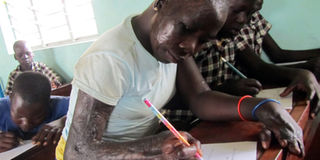Nodding children on road to healing

Ketty Adoch learns how to write at Hope for Humans Treatment Centre in Gulu District. The nodding disease victim sustained burns when she got seizure attacks and fell into the fire in 2008. PHOTO BY CISSY MAKUMBI
What you need to know:
The children are learning how to read and write but more is still needed.
Gulu
Songs of hope welcome you as you arrive at the nodding syndrome centre in Odek Sub-county in Gulu District. Hope for Humans Treatment Centre provides medication, food and basic education for 40 children affected by the mysterious disease.
One of the children is 14-year-old Ballam Opio who started receiving help from the centre in August last year.
Opio, whose mother died eight years ago at former Awer Camp, was attacked by the nodding syndrome in 2007.
“I grew thin and my father gave up on me thinking that I was going to die. My step mother also did not care for me. I was isolated from my step brothers and sisters for fear that they might contract the sickness,” says Opio.
With renewed energy, Opio walks two kilometres from his home in Akoyo Village to the centre daily for medication, food and to learn how to read and write. Opiyo is one of the more than 5,000 children who were affected by the nodding syndrome in Acholi sub-region. The disease also killed more than 400 children and efforts by scientists to ascertain its cause, treatment and mode of spread have proved futile.
Ketty Adoch, 14, fell into the fire in 2008 when she got a bout of seizure, a symptom common in nodding disease sufferers. Adoch, who was in P.4 when the sickness struck, says discrimination from home and school and constant nodding and seizures, forced her to cut her education short. “The scars are still painful and give me sleepless nights.”
Dr Nathan Onyach, the director Gulu hospital, says Adoch is suffering from hypertrophic scars arising from the burns. “Her elbow is unable to straighten and needs to be operated. She needs plastic surgery,” he explains.
The centre director, Ms Collin Angwech, says they opened the facility last year following outcry from parents who used to trek 15 kilometres to Odek Health Centre IV to get drugs and food for their children. “Parents were attending to garden work than to the health of their children,” she says.
The acting in-charge Odek Health Centre 1V, Ms Lydia Ajang, said since they stopped providing food stuff to children, some parents have stopped taking their children for check-up. “Some parents return to the treatment centre when the children have stayed for two to three days without medication,” she explained.
At the peak of the disease last year, the Ministry of Health recommended epilepsy treatment which they say was effective in controlling nodding and seizures. The district surveillance focal person, Mr Michael Cankara, said the two reviews they have carried out shows that the children suffering from nodding syndrome are improving.
Plan for surgeries
“Some children can now get to the centers on their own to collect medicines and nodding has reduced to twice a week compared to the recent past when it would occur like five times a day,” he said. Dr Bernard Opar, the principal medical officer in the Ministry of Health, said a team of plastic surgeons, eye and orthopedic specialists from the ministry will hold a rehabilitation camp in Pader, Lamwo and Kitgum districts in the next one month.




